Diets are one of the easiest and most common options for weight loss. In order to lose weight for a certain event and the extra pounds are gone for a long time, women and men resort to food restrictions. However, nutritionists warn that some diets can do serious harm to the body. And then instead of a beautiful and slim figure, we get a referral to a doctor.
How can you lose weight safely? Using a protein diet is easy! You don't have to exhaust yourself with constant refusal to eat and constant hunger. Protein food, which forms the basis of the diet in this diet, is quite filling. At the same time, it provides the necessary energy for the body and the person does not feel sluggish or depressed.
In addition, it is a perfectly safe way to lose weight - you will not be deficient in vitamins and you will lose muscle mass.
Features of the protein diet
As the name suggests, protein foods are the core of a protein diet. This is not only meat and milk, but also eggs, legumes, nuts. Protein should make up more than half of your daily diet. In this case, fats and carbohydrates should not be excluded, but rather restricted as much as possible.
Other principles of a protein diet:
- simple "quick" carbohydrates should be completely removed from the menu;
- it is desirable to use mainly natural vegetable fats;
- in order not to disturb the digestive process, vegetables rich in fiber should remain in the diet;
- during the day you need to eat fractionated, breaking the daily norm into 5-6 meals.
- With an abundance of protein foods, you need to exercise or be physically active every day - running a lot, going to the gym or the gym, etc.
How it works? The most important source of energy for our body are carbohydrates from food. When there is not enough of it, our body rebuilds to function and burns glycogen, which is stored in the form of subcutaneous fat. The body uses up its own energy reserves.
After seven days, the effect will be noticeable - 4-5 extra pounds will disappear. At the same time, muscle mass remains the same as there are enough protein products in the menu to "build" and restore muscle. The greatest effect occurs in three weeks - the excess weight disappears and the beautiful muscle relief becomes clearly visible.
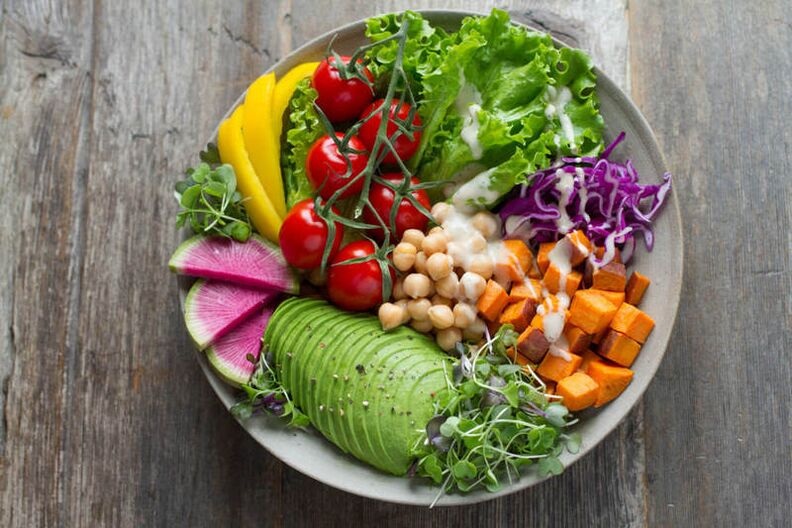
Rules for the protein diet
The protein diet is structured in such a way that our daily menu consists predominantly of proteins. But when creating a diet for every day or for the whole week, you need to adhere to certain rules:
- Monitor the quality of your products. Canned, smoked meat, semi-finished products are also prohibited during the diet, although they can be traced back to proteins. Fast foods and similar foods contain not only quick carbohydrates, but also rich in animal fats and harmful additives.
- Prefer lean meat and fish. These include birds, rabbits, marine and saltwater fish. It is better to temporarily refuse fatty pork and beef, as well as offal. Fatty meat is digested longer and puts more strain on the digestive tract and kidneys.
- Limit spices, preservatives, etc. When there is an abundance of protein-containing foods, the kidneys are more stressed than usual. Excess salt, spices and flavor enhancers hold back fluids and make the excretory system more difficult.
As with other diets, remember to drink plenty and keep track of your condition. If it starts to get worse, you should stop the protein diet immediately and see a doctor.
Allowed Products
What can you eat during a protein diet? The list of approved products includes:
- Flesh. It is recommended to eat chicken, turkey, rabbit fillet, lean cuts of beef, and veal.
- Fishes. Only unsalted and unsmoked fish, steamed or in the oven without additional fat, are suitable.
- Eggs. It can be either chicken or quail eggs. They can be boiled, eaten raw or prepared with a steam omelette.
- Milk and fermented milk products. These include unsweetened yogurt, sour cream, and low-fat cottage cheese.
- Vegetables. Green, high-fiber vegetables are allowed: for example cucumbers, zucchini, cabbage. They can be eaten raw, boiled, steamed, and baked.
- Fruit. Although this type of food is usually high in carbohydrates, you can include some citrus fruits in your diet to avoid vitamin deficiencies.
- Grain. Grains and cereals are banned, but you still can't do without them. It is recommended to add some buckwheat or oatmeal as a side dish.
- Tea. You can drink herbal tea or green tea without sugar. The rest of the liquid should be pure water. Only one cup of coffee is allowed per day.
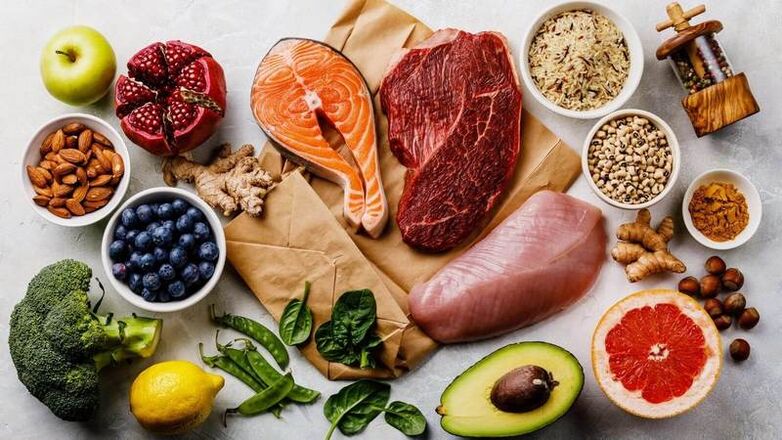
Prohibited foods
The protein diet therefore prescribes the maximum restriction of carbohydrates on the list of prohibited foods:
- Bread and pastries. All flour is forbidden. A slice of rye bread with bran or similar products made from yeast-free dough is allowed to be eaten a few times a week.
- Pasta. Even if they are of good quality and made from durum wheat, such foods should be completely eliminated from the menu during the diet.
- Cute. Sugar should not be consumed in any form, not even as an additive to beverages. Not only cakes and pastries are prohibited, but also other products that may contain it, for example ready-made shop sauces.
- Starchy vegetables. These are primarily potatoes, radishes, corn, celery, pumpkin. You can also add carrots and beets to this.
- Sweet fruits. Bananas, pears, melons should be excluded from the diet. Figs, dates and mangoes are also prohibited.
- Alcohol. Alcohol is completely excluded at once for several reasons. First, alcohol is almost pure carbohydrates and is very high in calories. Second, it is very dehydrating, stressing the liver and kidneys.
In addition, you must completely avoid fast food, sweet lemonade, fried, smoked or spicy foods during a protein diet.
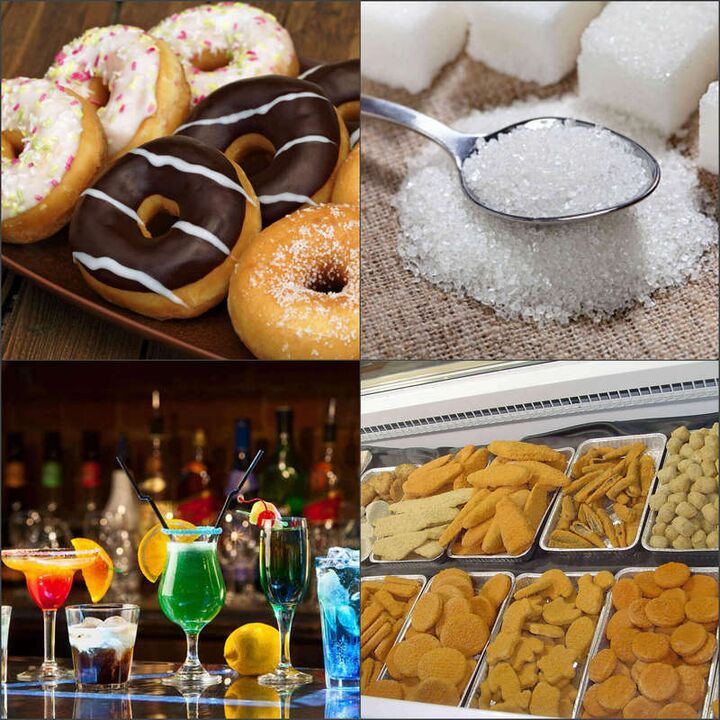
How to Switch to a Protein Diet
In order for the transition to protein nutrition to be as comfortable as possible and for weight loss to have the maximum effect, you need to gradually switch to a diet. It is worth gradually giving up carbohydrates in 2-3 weeks and limiting sweet and starchy foods. This is especially true for those who love sweets. If you abruptly exclude them from the menu, there is a great risk of failure.
1-2 days before starting the protein diet, you need to easily exclude other foods and switch to the planned diet. It is imperative to monitor your condition during the restriction. This applies not only to weight, but also to well-being. Pay attention to the condition of urine and stool, even if you have mild discomfort.
If you are unsure of your abilities, plan your first weight loss attempt on vacation. This will reduce the temptation to eat something forbidden with colleagues or friends.
It is best to put together a menu in advance, do some grocery shopping. Try to keep the refrigerator free of excess food that could overwhelm your efforts. The main condition is that the protein diet is accompanied by physical activity. Even if you do not do sports, it is worth exercising, running, cycling every day, or at least every other day.
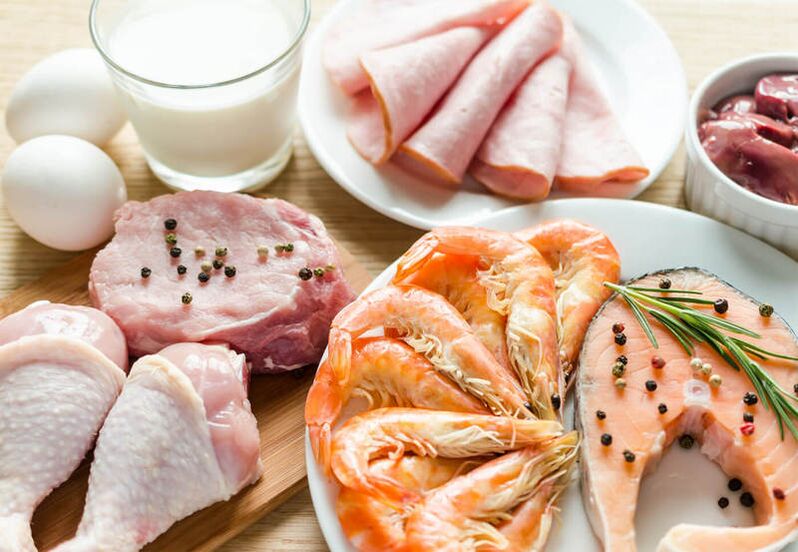
Duration of the protein diet
The minimum period for which a protein diet is designed is 7 days. It is considered optimal if you follow this diet for 10-14 days. During this time, you can lose up to 8-15 extra pounds and get a noticeable result. Such a time is good if, for example, you need to lose weight for a celebration and surprise the guests with a slim figure.
The maximum duration of a protein diet is 21 days. An extension of this period is harmful to health. This applies to those who do sports and want to "dry out" for competition. In all other cases, you should not go without a balanced diet and favorite foods for almost a month.
How often can you use a protein diet? It is recommended that you do not lose weight this way more than every three months. Give your body a chance to recover and normalize its metabolism before putting any more stress on it.
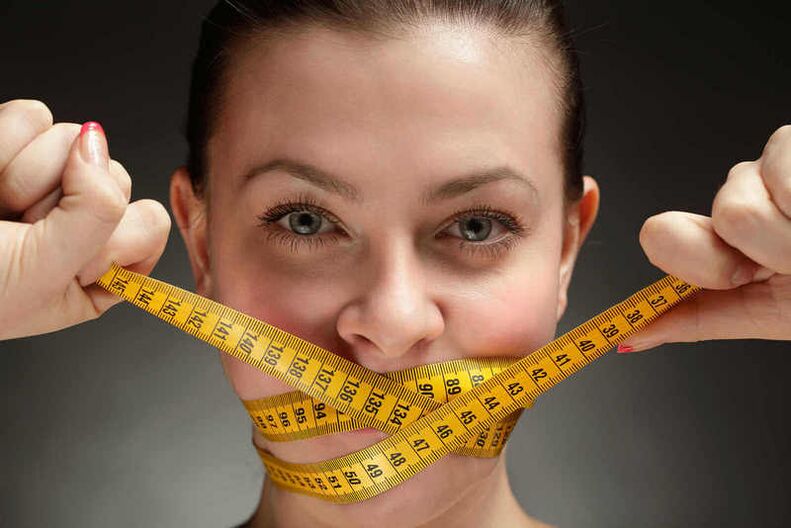
Getting out of the diet
Properly getting off the protein diet will help avoid putting undue strain on the intestines and digestive system, as well as the excretory system. As a basic rule, the exit should take twice as long as the diet itself. For example, if you've been sticking to the limits for ten days, it will take twenty to gradually return to the diet.
You need to introduce carbohydrates and other foods gradually and very smoothly. Start with vegetables and fruits and add a little of them to the menu. Cereals, pasta, sugar and potatoes should be introduced last and also smoothly, gradually increasing not only the variety of foods containing carbohydrates, but also their amount.
In order to maintain the results obtained, give up some bad habits:
- Restricting the use of sweet and starchy foods, especially baked goods, cakes, carbonated beverages;
- refrain from fast food and semi-finished products - they use products of not the best quality, seasoned with preservatives, coloring agents and flavor enhancers;
- bake foods in the oven or steam them, avoid fried, fatty, spicy foods;
- maintain a high level of physical activity - this not only contributes to weight loss, but also helps fight stress;
- Controlling alcohol consumption - regular get-togethers with a can of beer in the evening not only affects your figure, but also the condition of your hair, skin and the whole body.
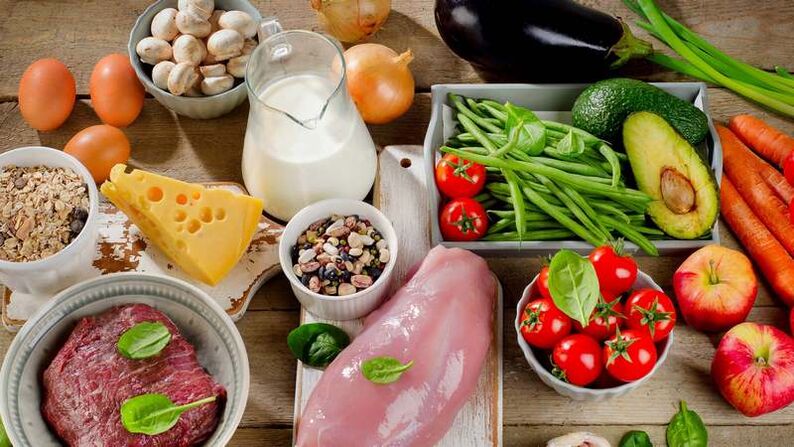
Protein diet: pros and cons
The protein diet is popular for its effectiveness - it can help you achieve noticeable weight loss. However, it suits many people. Among the advantages of this method:
- used a variety of products - you do not have to give up everything in a row, you can eat delicious;
- Lack of constant feeling of hunger - you should eat fractionated every 2-3 hours;
- rapid weight loss - the result appears almost instantly and can be kept for a long time;
- Weight loss through autologous fat - the body's reserves are used up without harm to health;
- suitable for athletes and active people - physical activity is a prerequisite for a protein diet.
Despite its many advantages, there are several disadvantages to this method of losing weight. Nutritional imbalances, which can cause calcium to be washed out of your bones, are often cited as the most serious. In addition, there may be other disadvantages:
- decreased cognitive ability and concentration of attention due to a lack of carbohydrates;
- increased risk of thrombosis and similar diseases due to increased blood clotting;
- Bad breath, which is caused by the high content of ketones that are constantly present in the body.
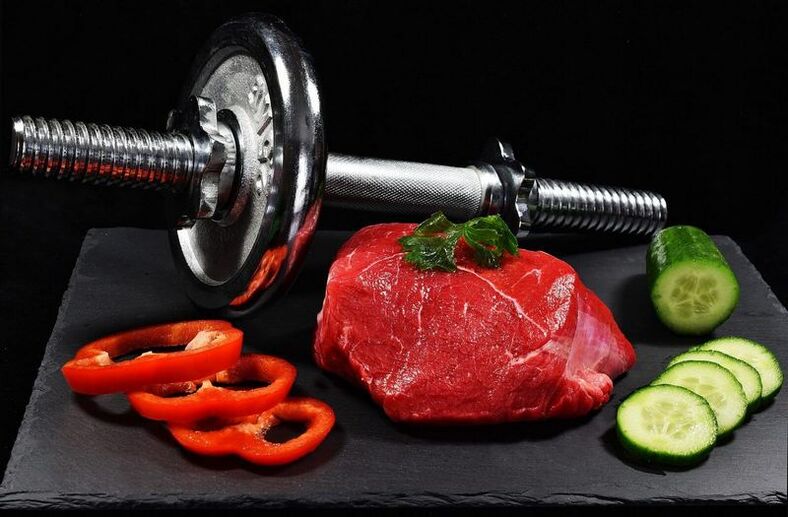
Contraindications
Like all effective methods of weight loss, a protein diet has contraindications. Before switching to a protein menu, it is best to consult a doctor with whom you will be checked regularly. This diet is not suitable:
- pregnant women and nursing mothers;
- older and young children;
- anyone diagnosed with cancer;
- People with chronic diseases of the kidneys, gastrointestinal tract;
- People who suffer from diabetes mellitus and other metabolic disorders.
In addition, you should not start losing weight during periods of increased physical or emotional stress. This not only includes final exams, but also a rush of work or a sharp change in climate.
You cannot go on a diet if you have acute respiratory or infectious diseases, as well as while taking medication. You need to first fully recover from any disease and take the necessary medication, and only then start losing weight.
During a protein diet, you can take vitamins, as well as complexes with macro and micro elements.

Common mistakes
The protein diet is a proven practice. If the weight persistently refuses to go, you have most likely made one or more common mistakes:
- Denial of physical activity. It is best to practice sports and exercise daily. But without stress, the restrictions won't work, so start walking and doing simple exercises in the morning. You can also do aerobics or fitness at home.
- Complete rejection of carbohydrates. Vegetables, fruits and grains need to be restricted as much as possible, but you cannot refuse them at all. High fiber foods should be kept on the menu for the intestines to function properly. In addition, carbohydrates are a source of energy that is needed for the brain to function.
- Quick switch to protein-rich foods. The gradual transition to such a diet is extremely important - you cannot abruptly remove all carbohydrates and fats. Otherwise, the body will experience stress, to which it will respond not only with poor health and a depressed mood, but also with the subsequent gain in excess weight.
Also, remember not to starve or overeat. A steady saturation throughout the day is important for satiety and lack of hunger and contributes to a normal strain on the intestines and liver.

graduation
With a protein diet, the menu consists mainly of protein-rich foods: meat, fish, dairy products, eggs. This diet does not help you lose weight from fatigue. To make up for the energy deficit, the body begins to burn its own fat. In this case, muscle mass can even increase - a sufficient amount of protein ensures muscle regeneration and growth.
Protein diet is suitable not only for weight loss, but also for the formation of a beautiful body relief. Although the technique works for many people, there are contraindications. You cannot ignore them - it can lead to sad consequences.
Therefore, the main thing is not to harm your body. Approach your diet change carefully and consciously. Do not force yourself or try to lose a few pounds during difficult times in life. If for any reason you are under excessive stress, anxiety, or on medication, postpone the diet for a while.


















